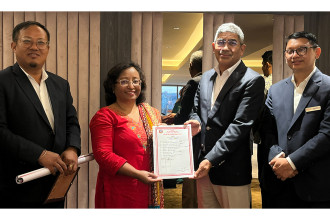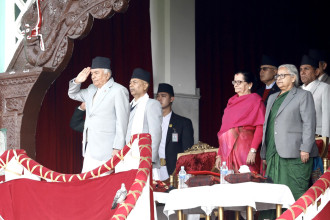
KATHMANDU: Federation of Nepalese Chambers of Commerce and Industry (FNCCI) President Chandra Prasad Dhakal has urged the creation of an investment environment, saying that more than Rs 1.1 trillion is sitting idle in banks.
Speaking at a programme organised in Kathmandu on Monday to mark National Tax Day, Dhakal said an investment environment is necessary to channel the funds held in banks into productive projects. “On one hand, there is plenty of money in banks right now, while on the other hand, some projects are neglected due to a lack of investment. This has led to an increase in project costs. In this situation, it is necessary to increase investment to make the economy dynamic. For that, an investment environment must be created,” he said.
Dhakal criticised regulatory bodies for failing to work effectively and urged the Finance Minister to address the issue. “When there were no officials at the Securities Board of Nepal (SEBON), work was affected for a long time, and even after officials were appointed, effective work could not be done. Improvement is necessary here. Such a tendency affects the investment environment itself,” Dhakal stated. He expressed dissatisfaction over SEBON not allowing hydropower projects to issue an IPO for a long time and urged the Finance Minister to resolve the problems at SEBON immediately. He also called for a single ISIN number for the dematerialisation of company shares.
On the Gen‑Z protest, Dhakal said the movement began with good intentions but was infiltrated by wrong elements who committed wrongdoing. “The private sector's umbrella organisation, FNCCI, also passed resolutions regarding good governance, anti‑corruption, and transparency at the last General Assembly. The Gen‑Z protest was also focused on these issues with a pure objective. However, the entry of wrong elements into the protest has led to vandalism, arson, and looting,” he said. “If the government does not take action against the infiltrators, the morale of the general public, along with the business community, will decline. If the government cannot secure the private sector's property, further investment will not be possible in the country, and a situation where investors flee will arise.”
He warned that without adequate security, similar infiltrations could recur and weaken the morale of individuals and businesses.
Dhakal welcomed government relief for businesses affected by the protests and praised recent measures by the Ministry of Finance to facilitate business, including online, faceless services from customs valuation to taxpayer certificates.
He also warned against retroactive laws, stating industrialists, businesses, banks and financial institutions (BFIs) face problems when such laws are introduced. “Investment will not come by merely saying we will bring investment in speech if investment is not encouraged. Easy laws and their smooth implementation are necessary for investment,” he said.
Dhakal said the Nepal Development Company, with a capital of Rs 10 billion, has been established through the initiative of FNCCI to ensure there is no capital shortage for infrastructure development, and he stressed the need to highlight Nepal’s existing potential.






